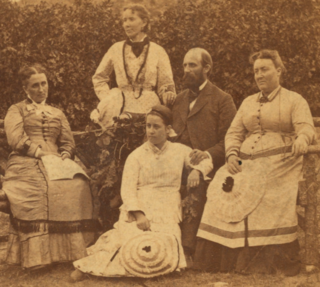Related Research Articles
Marriage, also called matrimony or wedlock, is a culturally and often legally recognised union between people called spouses. It establishes rights and obligations between them, as well as between them and their children, and between them and their in-laws. It is nearly a cultural universal, but the definition of marriage varies between cultures and religions, and over time. Typically, it is an institution in which interpersonal relationships, usually sexual, are acknowledged or sanctioned. In some cultures, marriage is recommended or considered to be compulsory before pursuing sexual activity. A marriage ceremony is called a wedding, while a private marriage is sometimes called an elopement.

Polygyny is a form of polygamy entailing the marriage of a man to several women. The term polygyny is from Neoclassical Greek πολυγυνία (polugunía); from Ancient Greek πολύ (polú) 'many', and γυνή (gunḗ) 'woman, wife'.
Polygamy is the practice of marrying multiple spouses. When a man is married to more than one wife at the same time, it is called polygyny. When a woman is married to more than one husband at the same time, it is called polyandry. In sociobiology and zoology, researchers use polygamy in a broad sense to mean any form of multiple mating.

In a culture where only monogamous relationships are legally recognized, bigamy is the act of entering into a marriage with one person while still legally married to another. A legal or de facto separation of the couple does not alter their marital status as married persons. In the case of a person in the process of divorcing their spouse, that person is taken to be legally married until such time as the divorce becomes final or absolute under the law of the relevant jurisdiction. Bigamy laws do not apply to couples in a de facto or cohabitation relationship, or that enter such relationships when one is legally married. If the prior marriage is for any reason void, the couple is not married, and hence each party is free to marry another without falling foul of the bigamy laws.

The Marriage Act 1961(Cth) is an act of the Parliament of Australia which regulates marriage in Australia. Since its passage in 1961, it has been amended on numerous occasions and applies uniformly throughout Australia (including its external territories); and any law made by a state or territory inconsistent with the Act is invalid. The Act was made under the power granted to the federal parliament under section 51(xxi) of the Australian Constitution. Before the passage of the Act, each state and territory had its own marriage laws. The Act only recognises monogamous marriages that comply with the requirements of the Act; other forms of union, including traditional Aboriginal marriages, are not recognised. However, the Family Law Act 1975 treats de facto relationships and polygamous marriages as marriages for the purpose of recognising the rights of parties at a breakup. Since 2009, the Family Law Act 2009 has also recognised the property rights of each partner of de facto relationships on separation.
Conflict of marriage laws is the conflict of laws with respect to marriage in different jurisdictions. When marriage-related issues arise between couples with diverse backgrounds, questions as to which legal systems and norms should be applied to the relationship naturally follow with various potentially applicable systems frequently conflicting with one another.

Marriage law is the legal requirements, an aspect of family law, that determine the validity of a marriage, and which vary considerably among countries in terms of what can and cannot be legally recognized by the state.
Polygamy is the practice of having more than one spouse at the same time. Specifically, polygyny is the practice of one man taking more than one wife while polyandry is the practice of one woman taking more than one husband. Polygamy is a common marriage pattern in some parts of the world. In North America, polygamy has not been a culturally normative or legally recognized institution since the continent's colonization by Europeans.

Joseph Smith, the founder of the Latter Day Saint movement, privately taught and practiced polygamy. After Smith's death in 1844, the church he established splintered into several competing groups. Disagreement over Smith's doctrine of "plural marriage" has been among the primary reasons for multiple church schisms.

The status and social roles of women in Mali have been formed by the complex interplay of a variety of traditions in ethnic communities, the rise and fall of the great Sahelien states, French colonial rule, independence, urbanisation, and postcolonial conflict and progress. Forming just less than half Mali's population, Malian women have sometimes been the center of matrilineal societies, but have always been crucial to the economic and social structure of this largely rural, agricultural society.
Akin to Uganda, Republic of the Congo and the Central African Republic, Zambia is one of the few Christian nations that allows polygamous unions to be legally formed. Under Zambian law, polygamous unions may be contracted and they have been reported to be extremely widespread in the nation. Similar to most countries that provide polygamy as a form of marriage, the first wife must consent to the practice of polygamy before she marries her husband. If she declines, her husband will not be allowed to marry another woman while married to his current wife. According to a 2003 survey, 16% of marriages in Zambia are polygamous. While frequently more common in rural areas, the practice can also be found in more urban settings.

Under civil law, Nigeria does not recognize polygamous unions. However, 12 out of the 36 Nigerian states recognize polygamous marriages as being equivalent to monogamous marriages. All twelve states are governed by Sharia law. The states, which are all northern, include the states of Bauchi, Borno, Gombe, Jigawa, Kaduna, Kano, Katsina, Kebbi, Niger, Sokoto, Yobe, and Zamfara which allows for a man to take more than one wife.
The current status of polygamy is difficult to determine in Botswana as, legally, only marriage between a single man and woman is permissible, though there is a notable loophole. A man can marry his first wife under customary law, while then marrying his second under civil law. While the practice was thought to have long disappeared from the region, it has been noted that polygamous unions are still active in Botswana, though not particularly common. Polygamous unions in the nation do not have any more effect in the areas such as divorce battles, sexual abuse and a higher spread of HIV/AIDS than any other relationship style. A lack of proper health care and unprotected sex leads to a higher spread of STDs of all kinds, which is a problem to begin with in the country.
Polygamy is legal under certain circumstances in South Africa. All polygamous marriages entered into in accordance with the provisions of the Recognition of Customary Marriages Act are legal. The husband in an existing customary marriage wishing to marry a second wife must apply to a competent court for such a marriage to be legal. Hence former President Jacob Zuma currently has four legally-recognised wives. The court considers the interests of all parties to the marriage and may add whatever conditions the court deems just for the polygamous marriage to be valid under customary law. Polygamous marriages are not allowed under the Marriage Act and the Civil Unions Act.
The legal status of polygamy varies widely around the world. Polygyny is legal in 58 out of nearly 200 sovereign states, the vast majority of them being Muslim-majority countries. Some countries that permit polygamy have restrictions, such as requiring the first wife to give her consent.
Polygamy is not legally recognised in Australia. Legally recognised polygamous marriages may not be performed in Australia, and a person who marries another person, knowing that the previous marriage is still subsisting, commits an offence of bigamy under section 94 of the Marriage Act 1961, which carries a maximum penalty of 5 years imprisonment. However, the offence of bigamy only applies to attempts to contract a legally recognised marriage; it does not apply to polygamous marriages where there is no attempt to gain recognition for the marriage under Australian law. Whether or not either or both partners were aware of the previous subsisting marriage, the second marriage is void. Foreign polygamous marriages are not recognized in Australia. However, a foreign marriage that is not polygamous but could potentially become polygamous at a later date under the law of the country where the marriage took place is recognized in Australia while any subsequent polygamous marriage is not. While under Australian law a person can be in at most one legally valid marriage at a time, Australian law does recognise that a person can be in multiple de facto relationships concurrently, and as such entitled to the legal rights extended to members of de facto relationships.
Polygamy is illegal in Ghana, but the restrictions are not heavily enforced. Polygamous marriages are illegal under civil law, though are arguably considered to be legal under customary law. Despite these exceptions, there have been no reports of a legally contracted polygamous marriage in Ghana; and are considered to be "de facto" illegal. An estimated 22% of Ghanaian women live polygamously.
In South Africa, marriage exists in a number of different forms, as a result of the diversity of religions and cultures in the country. A man in South Africa may have more than one spouse but a South African woman may only have one spouse. Historically the legal definition of marriage, derived from the Roman-Dutch law, was limited to monogamous marriages between opposite-sex couples. Since 1998 the law has recognised marriages, including polygynous marriages, conducted under African customary law, as well as religious laws such as Islamic law. In 2006 the South African constitutional court ruled in favour of recognizing same-sex marriage. It is currently the only country in the world to recognise both polygamy and same-sex marriages, albeit not in conjunction.
South African family law is concerned with those legal rules in South Africa which pertain to familial relationships. It may be defined as "that subdivision of material private law which researches, describes and regulates the origin, contents and dissolution of all legal relationships between: (i) husband and wife ; (ii) parents, guardians and children; and (iii) relatives related through blood and affinity."
"As far as family law is concerned, we in South Africa have it all. We have every kind of family; extended families, nuclear families, one-parent families, same-sex families, and in relation to each one of these there are controversy, difficulties and cases coming before the courts or due to come before the courts. This is the result of ancient history and recent history [...]. Our families are suffused with history, as family law is suffused with history, culture, belief and personality. For researchers it's a paradise, for judges a purgatory."

Polygamous marriages may not be performed in New Zealand. A married person who enters into another marriage in New Zealand is guilty of the crime of bigamy. Similar rules apply for civil unions, which have been legal in New Zealand since 2005. However, polygamous marriages legally performed in another country have limited recognition in New Zealand law, provided that no person involved was living in New Zealand at the time of the union.
References
- ↑ "Marriage Act (Chapter 5:11)". Zimbabwe Legal Information Institute. Retrieved 5 May 2020.
- 1 2 3 4 Gher, Jaime M. "Polygamy and Same-Sex Marriage – Allies or Adversaries Within the Same-Sex Marriage Movement". William & Mary Journal of Race, Gender, and Social Justice. 14 (3): 595-596.
- ↑ Wilfred N. Tichagwa (1994). Children and Women in Zimbabwe: A Situation Analysis, Update 1994. UNICEF. p. 46.
- ↑ Megan J. Smith (2008). Child Sexual Abuse: Issues and Challenges. Nova Publishers. p. 129. ISBN 9781600219993.
- ↑ "Zimbabwe PM marries woman under polygamy custom". Reuters . 16 September 2012.